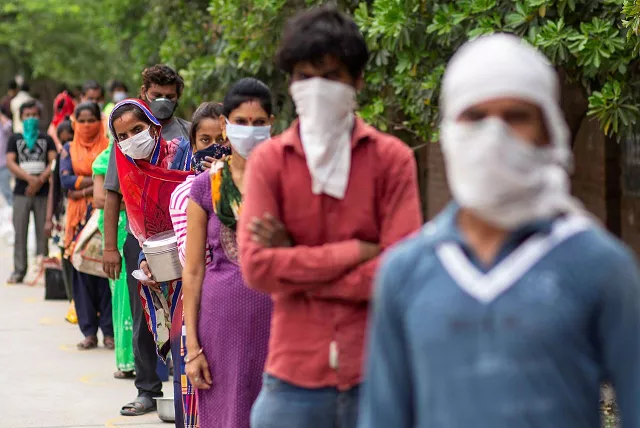NYT outlines Modi's failure in dealing with Covid-19 pandemic
Starkest failure of Indian govt's strategy has been the devastation it imposed on country’s workers, reads the...
The New York Times -- seen by many as the world’s most authoritative newspaper -- in an article on Wednesday outlined the failure of Prime Minister Narendra Modi's government in dealing with Covid-19 pandemic, which has so far claimed over 4,300 lives and infected more than 150,000 people in India.The article stated that the starkest failure of Modi’s coronavirus strategy has been the devastation and misery it imposed on the country's informal sector, mostly comprised people from impoverished villages, who work in cities, without a safety net.
"Hundreds of thousands of migrant workers were left without wages after the lockdown imposed with a four-hour notice closed factories and businesses. They couldn’t pay rent; they didn’t have enough to eat. They looked toward their villages, where they could find shelter and food by relying on extended family," it added.
'Narendra Modi, an international embarrassment'
The American daily criticised the Modi government for abruptly suspending public transport, adding that the workers were forced to set out on foot, walking hundreds of miles in temperatures as high as 100 degrees Fahrenheit (around 40°C), many died in the process.
The article pointed out that the lockdown was observed with ease by the middle and upper classes, who can afford to do so. But the coronavirus cases are spreading fast in dense urban clusters of the poor, who can’t afford the luxury of social distancing. "It is India’s poor who are and will be affected the most by a rising number of infections and economic hardship," it added.
According to the article, a staggering 60 per cent of the coronavirus cases in India have been reported from five cities — Mumbai, Delhi, Ahmedabad, Chennai and Pune.
"India’s commercial capital, Mumbai, and Pune are already running out of hospital beds for critical patients. Mumbai is the worst hit and accounts for more than 20 per cent of all cases, and the rise in cases is outpacing the ability of the city to ramp up its health infrastructure."
The article said that of the 30 countries that have registered more than 25,000 coronavirus cases, India, Pakistan and Bangladesh are among the countries with the lowest levels of testing per million people, which raises questions about whether statistics on the slow spread of the pandemic in South Asia are a result only of the lack of testing.
But the low fatality rates in South Asia, the article added, seem to be real because no evidence has surfaced of large-scale under-reporting of deaths across India, Pakistan and Bangladesh.
Misinformation fuels hatred against India's Muslims in times of Covid-19
"It seems that a major factor explaining the lower fatality rates in South Asia is demographics. The median age in India is 29 years, 23 in Pakistan and 27 in Bangladesh, while the median age is 38 in the United States, 40.5 in Britain and 45 in Italy."
Earlier, the Wall Street Journal also published articles on how “Modi’s Legacy May Be Instability and Stagnation” and how “Modi Courts Chaos by Snubbing Persecuted Muslims.”
The Financial Times’ most eminent commentator, Martin Wolf, sharply criticised the Indian government’s economic policies. Another columnist, Gideon Rachman, bemoaned its increasingly illiberal approach.
A further article by Wolf – reprinted in South Africa by Business Day, its most formidable daily – worried that in the teeth of the economic slump, the Modi government might resort to ”Denial, Fear and Crackdown”.
Time magazine, which is widely read across the US, labelled Modi India’s “divider in chief”.
The Washington Post published several critiques and posted a video of the violent police attack on people within the library at Aligarh Muslim University (AMU).
The US Commission on International Religious Freedom, an official government body, issued a Factsheet on the Citizenship (Amendment) Act (CAA) that sharply criticised the Modi government.
Satya Nadella, chief executive of Microsoft and an Indian American, described the CAA as “just bad”.
In Germany, the popular weekly Der Spiegel ran articles on Modi as a nationalist tackling “200 million enemies” (Muslims); and on the religious bias of his government. The influential Suddeutsche Zeitung published a warning that India’s constitution was at risk.
The article was originally published in The New York Times


COMMENTS
Comments are moderated and generally will be posted if they are on-topic and not abusive.
For more information, please see our Comments FAQ